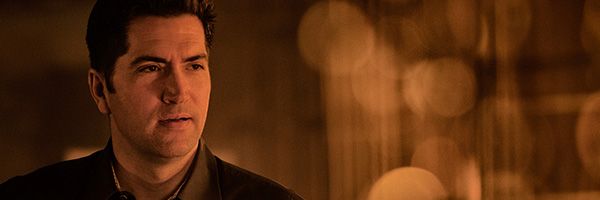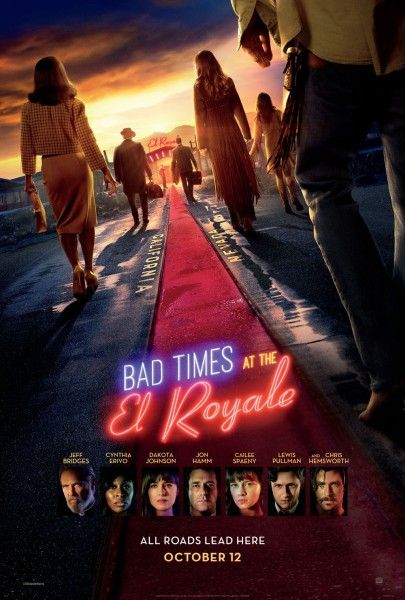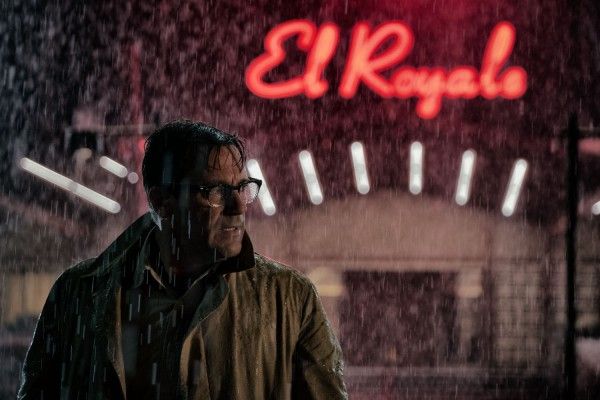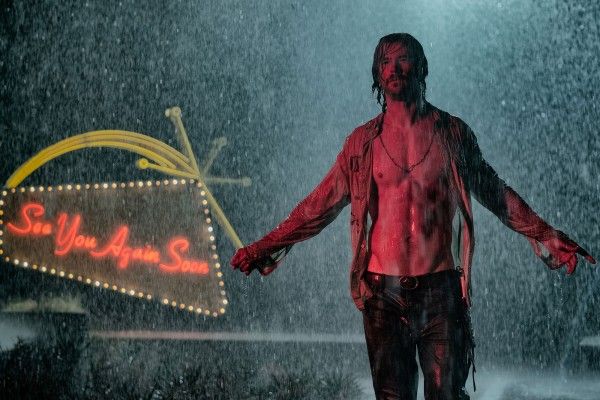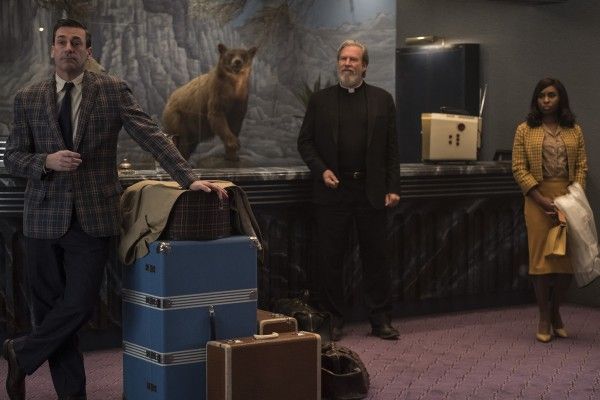It’s been too long since the last Drew Goddard movie. Although Goddard has been attached to a host of projects, his first directorial effort was 2012’s The Cabin in the Woods. Thankfully, after six long years, he has returned to the director’s chair with Bad Times at the El Royale. The film opened last Friday and focuses on seven strangers in 1969 who come to the El Royale hotel, which is on the border of Nevada and California. As the night wears on, secrets are revealed, and almost no one is who they seem to be.
Earlier this month, I had a chance to talk with Goddard about the movie. We discussed his screenwriting process, putting together the soundtrack, and the difficulty of getting the film into production. We then move into spoilers to discuss some more specific elements of the movie including how he came to the ending.
Check out the interview below. Bad Times at the El Royale is now in theaters, and you can click here to read Haleigh Foutch’s review.
In your commentary for Cabin in the Woods, you and Joss Whedon talk a lot about set up and pay off when writing a screen play, and I was curious if you could talk about that process here when you've got a movie that jumps back and forth in time.
DREW GODDARD: Yeah, I mean you really use ... first and foremost my I would say that's my first rule of screenwriting, which is it's all about set up and pay off. With this movie in particular there is no wasted time, everything is setting up something. We spend the first act or so first 40 minutes really setting all the pieces in place so that when they start to fall there's a very clear moment when the pieces start to fall in this film. When that happens, a character gets hit in the head, and when that happens it's because of all the set up that we'd done that then allowed the audience to sort of go on.
So when you were writing the screen play, did you have sort of the time jumps in there or was that something you found more in the editing room?
GODDARD: Yeah, well it was all in the screen play. This movie is so complicated, from a pure structural stand this was not the sort of movie where you could just shoot a bunch of stuff and figure it out later. We had to be very clear about every decision every step of the way.
Was it difficult to get this movie made since it wasn't based on a pre-existing property?
GODDARD: I would say no more so than any movie. I mean even pre-existing property are tough to get made unless you're dealing with Marvel or Star Wars. Everything's kind of tough to get made these days, and we're not worried about it too much. I tend to just write what I want to watch, and then hope that other people will want to watch that too. In this case it worked out. If they treated every movie that I've ever made that has my name on it seemed like a crazy idea at the time, even something like The Martian, which did so well, it's still going into the studio and pitching, “Here's an E-book based on a man who makes potatoes in his own feces,”—it wasn't the sexiest pitch, and yet I always trust that if I love something I can convey that love to the audience and to the studios.
Everyone here in the movie is so perfectly cast, did you have actors in mind for these roles?
GODDARD: I didn't. I tend when I'm writing to not think about actors, I try to really focus on characters. It's not until I'm done with the script that I really turn my attention to it, to the actors. In this case, when I finished the script I thought, "Okay, we should start with Father Flynn because he's such an integral role to this film," and the very first name on the list was Jeff Bridges and I learned it never hurts to ask, swing for the fences, because the worst they can do is say no. I said, the first person I sent the script to in this entire process is Jeff and he said yes right away. It really just allowed us to get everyone else. Because you learn very quickly that every actor on the planet wants to work with Jeff Bridges.
What’s great is that it seems like almost every actor in this movie does get a chance to interact with Father Flynn in some capacity.
GODDARD: It was important to me that this is a movie that's very much about people listening to each other, or not listening to each other, or learning to listen to each other, and their interactions with one another and it was important to me that they all had their sort of moments of empathy with each other.
Something else I wanted to talk about is that the soundtrack for this movie is outstanding and I was curious about your process for choosing the songs, not just those featured on the radio but also the ones Darlene would have to sing.
GODDARD: I mean it actually started with those songs, it started with the songs that Darlene would have to sing cause her character is very much a person who does not talk about her emotions, she learned in her life that she needs to stay armored to protect herself so she never gives away her emotions in dialogue. What happens with her is her emotions come out through song, and they come out when she thinks no one is watching her, and she keep thinking on what she is trying to make her art. And so I knew very early on that the songs needed reflect the emotions she's going through at any given moment and I started there. I started with what this character going through, okay lets see if I can find a song that evokes the same emotion in me.
That led to a very organic process of structuring the film and the songs, and then with the other stuff that is on the jukebox I think a lot of that just comes from songs I love and similarly songs that reflect the emotion of the scene at the time and what I wanted to deal with in those scenes, and so it was just an organic process of me sitting down with my records and finding the songs I loved and then structuring the movie around.
Were there any songs that you weren't able to get a license for, or were you able to get everything you wanted?
GODDARD: We got everything we wanted. I mean one of the things I did was I wrote this movie on spec, and I wrote every song into the script so that when I took it to studios I could say listen don't buy this movie if we can't have these songs. Lets get the songs now, before we even commit to this cause I don't want to make this movie if I can't have these songs because these songs are very much in character of the film. It's crucial to have these particular songs.
And so yeah, I'm trying to think, no, we got every song that we wanted, thank God!
What were some of the challenges during production on this film that you hadn't encountered before in your previous work?
GODDARD: I think first and foremost the movie takes place over a twelve-hour period on one night, right? And 60 pages of that I think are in the exact same location, are in the hotel lobby so that actually leads to a genuine continuity nightmare, because when you're shooting this over 3 months, right? Somebody sits down and eats a piece of pie for instance, that pie has to stay exactly where that person left it for the next 3 months of shooting. So, all those little things and each line was so important, we learned very quickly we needed to shoot in order because the environment gets so sort of destroyed as this movie goes.
It's one of the things you don't really think about and hope that the audience doesn't really think about it as they're watching it, but for us it really required a real attention to detail. Everything you see in the opening shot when characters first walk into the lobby has to be in place now for the next 3 months of shooting. And every little change from that point forward has to be reflected in the movie. Luckily, I had actors who were so good, and so precise that they could remember what they were doing and emulate that over that 3 month period so that the continuity stayed extraordinary.
I want get into spoiler territory, and this will run after the movie has been released. The first question I have is about the dichotomies and juxtapositions, not just in terms of the setting but in that most of the characters aren't who they appear to be. I was wondering if you could talk a little bit about sort of these dividing lines, and emphasizing the duality of, sort the people in the story.
GODDARD: I'm trying to remember when duality came to the forefront and that sort of artistic process. It was very much sort of our guiding principle of this film. I think it must have been as I was thinking about these characters and thinking about how nobody is who he or she appears to be upon first meeting them and that everyone has sort of this second life.
That sort of dictated the idea, I think I was thinking of that before anybody had the setting, cause the setting and the environment very much reflects that duality as well. I tend to like to work that way. I tend, especially when I'm directing, I like every decision to have a reason behind it, to fit the scene. Scene is very important to me, so it happened organically, I think it started with characters as we were sort of exploring who these people are and very quickly realized if you have a movie where everyone is lying, that means there's also a truth to uncover about those people and I just sort of led us to this idea that everyone is sort of leading a dual life in the film.
It's not necessarily a good and evil split, it's more like again there's two sides rather than one face is good and one face is evil.
GODDARD: Correct, that's sort of the idea. I find that as I humanize characters, they become more complicated and because of the humanity I think we all sort of exist in shades of gray. The movie is not meant to be, even though there is a sort of polarity about the movie, everyone exists somewhere in between the two poles.
A similarity between this film and Cabin that jumped out at me was the power of the voyeur whether it's the technicians in Cabin or management in Bad Times. Do you see that voyeur as sort of an audience surrogate?
GODDARD: I think so. I don't know, it's funny, I've only recently started to think about that. I've realized the concept of the voyeur tends to come up again and again in my work, it's even in the Martian for instance. I tend to be fascinated by that, I think it must stem at least in part from my intense and passionate love of cinema. There is something inherently voyeuristic about sitting in a theater and watching other people's lives unfold on screen. At its core, cinema is voyeuristic and so I think that's where it comes from but to be honest I may need a little more psychoanalysis to figure out why I keep coming back to these themes time and time again.
The movie ends with Doc and Darlene sort of finding their way out of purgatory and into a paradise. Was that always the ending you envisioned for the movie?
GODDARD: No, honestly when I started I intentionally said lets just start with characters. Lets start with these seven characters and see where they take us, see where the story wants to go. As I've gotten older, I've gotten more comfortable with not knowing and allowing the artistic process to tell you where the movie wants to go. I think it was probably about half way through when there's a key moment between Doc and Darlene early in the film. A key moment of lets call it violence, between the two of them. And once I realized that, we were off to the races, I wanted to see their story finish. I kept coming back to Darlene as I was writing this one, I kept finding that she wanted to step forward and step to the forefront of the story.
And so, it sort of happened organically. I just felt like the logical ending of the story was Darlene standing there on stage and then the story dictated that.

